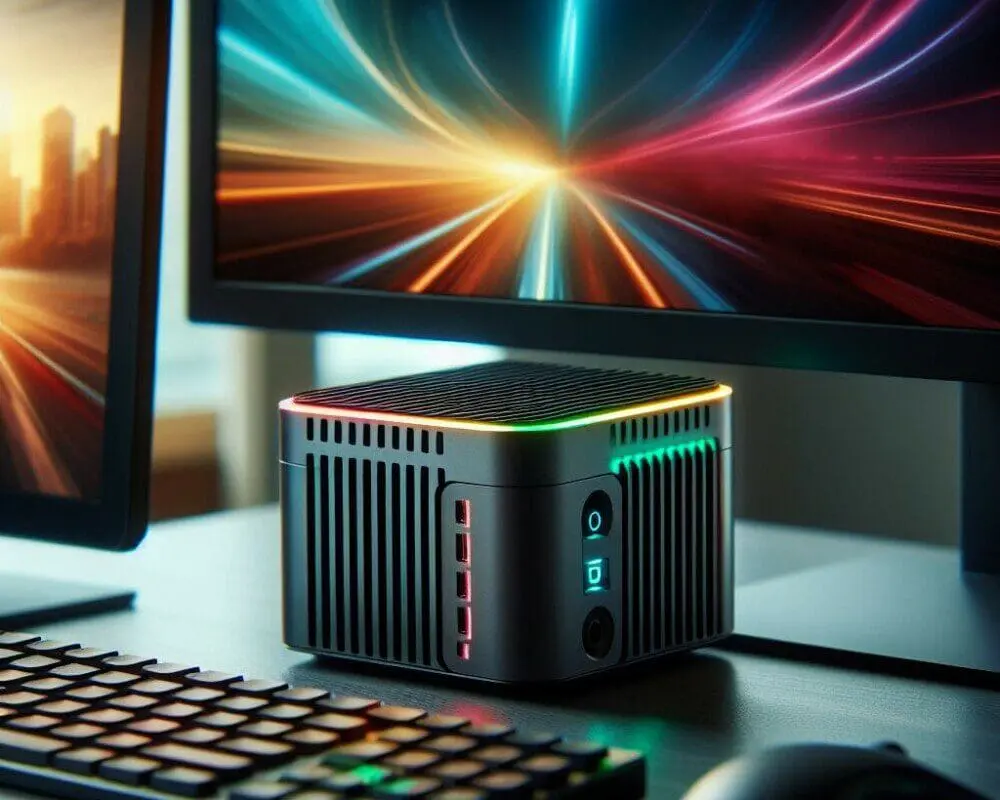choosing a mini PC in 2024
Imagine a world where your entire computer fits neatly on a bookshelf, tucked behind your monitor, or even in a bag as you zip to the next meeting. That’s the realm of the mini PC. In the vast landscape of computer options, these compact marvels have sparked a revolution, merging desktop power with space-saving design.
Despite their small stature, mini PCs are no novelty; they’re a testament to how far technology has advanced. As you stand at the crossroads of upgrading or buying a new computer, you’re likely considering whether a mini PC is the right fit for you. That’s where I come in.
In this article, I’ll lay out a crystal-clear map to help you navigate through the choices and find the mini PC that aligns with your unique pile of needs and wants. You don’t have to be tech-savvy to follow along; my aim is to distill the jargon into practical advice that everyone can understand.
Getting it right matters. Whether you’re into the latest gaming titles, cozy movie nights, or crunching numbers for work, there’s a mini PC out there with your name on it. And the decision isn’t solely about specs; it’s also about how this piece of technology will fit into your life, both now and in the foreseeable future.
Understanding Mini PCs
Mini PCs capture the essence of innovation in a small package. When I say “mini,” I’m talking about desktop computers scaled down to sizes that make them easy to tuck away behind a monitor or on a bookshelf. Despite their stature, these compact machines are fully functional PCs, boasting the ability to run standard operating systems like Windows, Linux, or macOS.
Their popularity isn’t just a passing fad; it’s a functional shift in how we interact with technology. Space is a luxury, and the compact frame of a mini PC makes it a favorite among those with limited real estate. I’m looking at city dwellers, small office/home office users, and people craving minimalist setups.
A common misconception is that smaller equals less power. I’m not going to mislead you-that can be true, but today’s mini PCs punch well above their weight. Many models come with the same components you find in larger desktops, which means you’re not sacrificing performance for size.
But these benefits don’t stop there; mini PCs consume less energy than their full-sized counterparts. This isn’t just good for your electricity bill, it also means they run cooler and quieter-a godsend if you’re working in a peaceful environment.
After getting a firm grasp on the mini PC concept, the next step is to consider how one of these space-savers will fit into your life. And that means looking closely at how you plan to use it.
Assessing Your Needs
I always stress the idea that choosing a mini PC must start with a crystal-clear understanding of what you’ll use it for. The range of possibilities is wide, and the choice you make needs to align perfectly with your daily demands. Whether you’re looking to enhance your home theater, power through office tasks, or dominate in the latest games, every use case calls for a different set of specifications.
If your aim is to have a sleek home theater setup, a mini PC that supports high-definition video and audios, such as an HDMI output, is non-negotiable. On the other hand, if you’re replacing your bulky old desktop for regular office work, prioritize a system with ample storage and quick multitasking abilities – this means sufficient RAM and a capable processor.
Gamers, on a separate note, should be eyeing mini PCs with high-end processors and graphics cards to handle intensive gaming workloads. While not all mini PCs are cut out for gaming, some are specifically designed with gaming in mind, coming close to their full-sized counterparts in performance. However, they also come with a higher price tag, indicating the trade-off between power and cost.
At this stage, you should also consider the longevity of your device. Think about future demands and decide whether you might require upgradability. Mini PCs vary in their ability to upgrade – some allow for RAM and storage swaps, while others are sealed units. This could be a deal-breaker if you foresee your computing needs evolving.
Remember, you’re not just buying a mini PC for today – you’re investing in a machine that should serve you well for years to come. Select with foresight, thinking ahead to what your needs might be down the line.
Conclusion
You now have a clearer understanding of how a tiny box can pack a powerful punch. With a solid grasp of what’s out there, you’re well-equipped to choose a mini PC that aligns with your specific needs. The journey to finding the right device should have no shortcuts, and armed with the knowledge from this article, you’re ready to make an informed decision.
Remember, while performance specs, connectivity, size, price, and additional features are essential, it’s your unique requirements that dictate the perfect match. Whether for work, gaming, or your living room, the right mini PC can elevate your experience without overwhelming your space.
So, take your time, weigh your options, and pick the mini PC that can turn your everyday tasks or entertainment aspirations into reality. By focusing on what matters most to you, you’ll make a choice you’re content with—one that doesn’t just tick the boxes but truly complements your lifestyle.
Consider the features, the form, and the function, and you’ll discover that the best things often do come in small packages. Reflect on your needs, mull over the recommendations, and take the plunge when you feel confident. Happy computing!
Now that you know what to look for you should check out my Top 10 budget-friendly Mini Pcs blog


